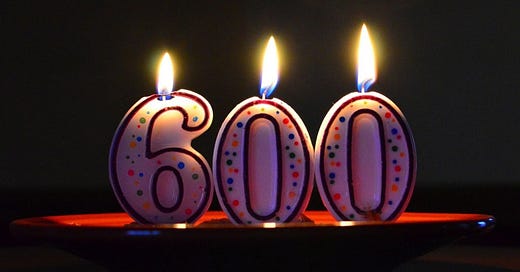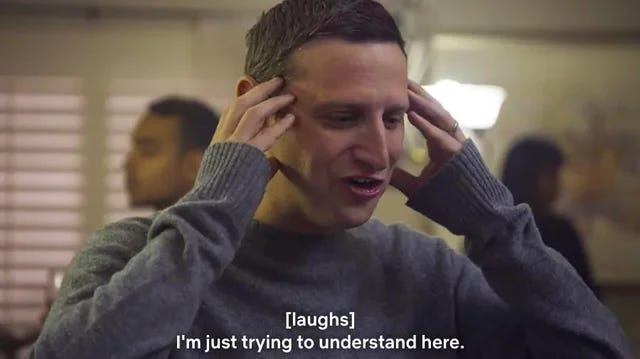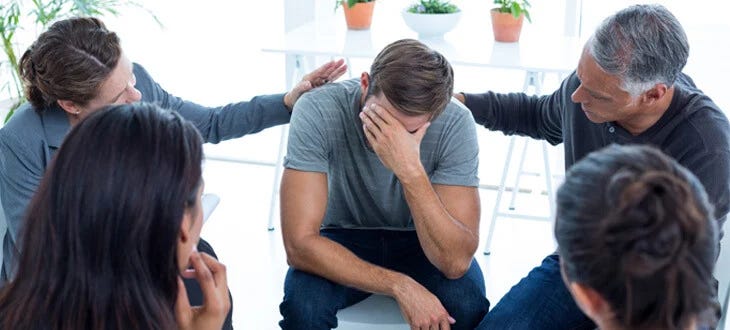I hate doing this, so I do apologise for starting with this:
I’ve been trying to share my writing, but I’ve found that it’s incredibly hard to self-market myself in any of the Gambling/G.A./Recovery groups on social media. People always think I’m attempting to lure them in and sell them something - which you and I both know is simply not the case. If you really enjoy this article, or any other one, or just my writing in general, please consider sharing it. It won’t make me any money; all my articles are free and there’s no ads etc - so I promise this is not a money-grab. But it might put my writing in front of someone who desperately needs to read it. Thanking you in advance x
This week I reached 600-days Gamble Free.
600 days gamble free. Who would’ve guessed? Certainly not me; though perhaps a certain gambling counselor of mine once did. For those in my life who believed in me when I couldn’t, everything I do is a testament to you and your faith. To those who prayed for me when you didn’t know for sure what was wrong, I am beyond blessed to call you a friend.
If I were a better literary artist, I’d title this post something insane like ‘THE 5 BEASTS I HAD TO SLAY IN ORDER TO DEFEAT GAMBLOR!!’. But alas, my skills seem to stretch between personal reflections, Simpson’s references, and non-rhyming poetry. Whilst reflecting on the steps I took to get where I am today, however, I did realise that there were 5 major things that I did which enabled me to find my footing in sobriety.
These steps are not a guide; not recommendations, nor do I have the qualifications to know if they were even the best way for me to have done it all. I would encourage you, the reader, to simply look at them as a commentary on what I did, and how it helped me.
1. Therapy.
I’ve spoken about this a lot, so I’ll keep it short.
Therapy, therapy, therapy.
It’s absolutely essential; it’s really the first step into working on your compulsive gambling. Not just any therapy either, I should add, as many Psychologists simply do not seem to be trained to handle/guide a problem gambler. There are quite a few Gambling resource hotlines/websites that will help you identify what may be the best route for you; it really does depend on what country you’re in and what’s on offer.
For me, living in Brisbane, Queensland - I personally cannot recommend the team at Relationships Australia Queensland enough. A certain gambling counselor at one of their locations was one of few who saved my life — through caring and love that far exceeded anything I’d received elsewhere.
I also had my mentor who I’d meet to chat with each Saturday, my Psychiatrist; and, for a short period, an OCD Psychologist.
The quantity of these sessions may seem to be overkill, and after a while they were. Yet there was a period of time where they were all but essential. With shame being the name of the game when it came to my poor mental health, these specialists had a lot of work to do when it came to unraveling the years of addiction that I had dealt with myself - poorly.
Yet I reiterate - for me, these sessions, in their quantity, were essential for me. Gambling-specific, addiction-trained Psychologist/s kept me alive during this horrifically dark period; starting me on the journey towards loving myself again.
2. Progressively telling loved ones.

I’m not going to list the order in which I told specific loved individuals, as for a lot of it; there truly was no rhyme nor reason as to why I did it the way I did it. There was, of course, some people which took longer for me to tell - such is the nature of extreme shame.
My main point here is that I didn’t blurt it all out at once, nor to everybody. Regrettably, some friends found out earlier than I would have liked, and with the wrong intent. There are few things I still struggle to not really dwell on, but knowing that friends of mine only found out about my gambling when I went to them asking for money; or about my suicide attempts when I posted a shitty poem alluding to them makes me a little sick.
Every single time in my life, that I have been terrified of telling somebody about my gambling addiction, their reaction has been the complete opposite of what I feared. I have been met with nothing but love, support, concern, and - rightfully so - a fair bit of confusion. If you’re struggling to reach out and tell people for fear of abandonment and hate, let me tell you this - it may happen. I wasn’t married, and spousal commitments and family ties completely change dynamics when it comes to these things.
Every single time in my life, that I have been terrified of telling somebody about my gambling addiction, their reaction has been the complete opposite of what I feared. I have been met with nothing but love, support, concern, and - rightfully so - a fair bit of confusion.
But, for me, my family and my friends have stood by me and loved me more than I ever thought possible. Telling them of my struggles, and realising that my guilt and shame was built on nothing more than the lies that my head had created out of years worth of fear, absolved me of everything I needed to continue to pursue abstinence through the 12-step program. And, for that matter, the courage to share as freely as I am with you today!
3. Attending G.A. in person.
Walking up that ramp to my semi-local G.A. meeting was the most anxious I had been in quite some time. I remember meeting people outside - lots of handshakes and genuine small talk. Whatever the hell genuine small talk is, anyways — all I know is I was spoken to, but never once told how good the weather was that day. People here weren’t intense or abrupt, but they also weren’t here to fuck spiders.
I was welcomed into the room with loving, open arms. Not in a cultish, physical way - but in things like the same levels of applause for my tiny 1.5 days of not gambling, as someone else’s 16 years. I finally felt accepted, loved and understood. It wasn’t that my friends and family hadn’t tried to show me these things, rather that they simply couldn’t. Just as I can’t sit beside someone struggling with a narcotics addiction and truly understand why they continue to inject or smoke; my friends were weren’t - and possible may never be - able to comprehend my actions.
I specify ‘in person’ here, because for me, it has to be (primarily) in person. Zoom has its place, absolutely. Without it, I wouldn’t have been able to check in whilst I was in hospital. However, if I’m able to attend, I have to. To join the meeting using Zoom is to guarantee about 50% of my focus to be elsewhere for its entirety.
Plus, there’s something so nice about being able to fill one of those creaky chairs on a Monday night...
4. Surrendering financial access.

My final step towards Recovery was to surrender all of my financial access to my Father. Well, almost everything. My pride still clung on just enough to try to keep my debit card ‘secret’ - i.e. where Dad, who was now handling the rest of my finances, couldn’t see where I was spending it. At 26, it’s a bit rough to suddenly have to give it all up to your Dad.
Did I go into this - the keeping of some of my financial life to myself - with good intentions? Possibly; though probably not. My brain was still very much hard-wired to gamble at all costs, and I knew that if Dad could see EVERYTHING I was doing; this would be an impossibility.
It wasn’t a good idea, something that I’m sure surprises no-one. Within a fortnight I had [REDACTED*] (*worked out a way to obtain more funds without Dad knowing. It wasn’t illegal and I sold nothing, but I don’t want to give anyone struggling ideas.)
After about six weeks though, I realised that I simply wanted nothing more than to stop gambling. What a relief this was. I met up with Dad for a coffee, apologised for doing what I had done behind his back to get extra money to keep gambling with, and relinquished absolutely everything.
It wasn’t nice, I can’t lie. I was 26 years old, and I couldn’t dictate where a dime of my pay/money went. I couldn’t take a 50c bus fare without knowing in the back of my mind, Dad could see it.
It was...invasive.
It was...embarrassing.
It was...the greatest thing I ever did.
On so many levels, it was effective. I could no longer ask friends for any amounts of money without it being seen - which helped improve my relationship with friends in the realm of money. They knew that anything they’d send - for small things; paying their share of concert tickets etc - was all ‘above board’ and would be reviewed by my own personal bank manager.
I couldn’t go pawn items to gamble with, as I once had. I couldn’t buy alcohol without even the smallest purchases raising a brow and instigating a message via facebook.
But the most helpful thing that came from this, in time, was that I was able to finally breeeaaathe when it came to my money. Dad graciously took over ALL facets of my accounting; in that my bills were paid by him (with my wages), savings were slowly allocated, and for the first time in its length lifespan - my bank account was finally treated to a budget. I imagine, if savings accounts were physical beings, this would have been like a stray dogs first warm shower.
Both I, and my everyday banking account, were wrapped up in blankets by the fire; after a devastatingly long time out in the cold.
...
Note: It goes without saying that I am incredibly beyond blessed to have been able to have a family member that I could completely trust to do this for me. Again, this is not a recommendation.
5. Immersing myself in a passion.

I’ll keep this one really short, and definitely hypothetical.
Write poetry. Write so many poems that you think ‘hey, I could collate these into a book’. Begin assembling said book. In a moment of procrastination, begin writing about your gambling story on Substack. Find yourself dedicating all your creative time to the Substack writing. Realise you’re chewing through time that you should be spending organising the book.
Thank goodness for self-publishing, right?
My follow-up tip would probably be: aim to diversify your passions.
Why I didn’t include Self-Exclusion.
For those unaware, self-exclusion is best explained in a physical sense. If I have a problem with the Pokies (slot machines), then I can request that a specific Pub/Club no longer allow me to enter their venue/s. This is usually for a specified period of time; starting with an amount of months, and going for as long as a patron’s entire life.
A similar system now exists for the online world of gambling, at least here in Australia. BetStop is a national self-exclusion registry; by registering a couple of years ago, it is now illegal for online, Australian-based betting companies to accept me as a ‘customer’.
On the surface, this would appear to be the thing that would fix all my problems, right? Well, not quite - and this is why I didn’t include it here. Don’t misread me on this, self-excluding through BetStop was a massive step forwards for me. Though in the early stages, when I first did it, I wasn’t at a point where I was ready to give up gambling just yet. So from a harm-minimisation viewpoint, it probably wasn’t the best thing for me.
Within a few days, I had signed up for a few unregulated, overseas-based bookies. For a problem gambler, this is as close to the Wild West as things can get. Thankfully, this period didn’t last long for me, and it ended with the second time that I had told my Father about my gambling; truly ‘hanging up the boots’ for good.
Because, however, it could have ended up being a lot worse for me (i.e. my data being breached etc) I both count myself extremely lucky, whilst also not adding this step to my list.
My realistic journey.

These 5-steps are, in theory, great. Are they realistic? Sure - as a guide. What they do not include, however, are the thousands of tiny steps that I took in this journey towards 600 days gamble free.
I attended Dayhab. I was in a Psych ward for 6-weeks after 3-months of not gambling. I drank, I hid away from the world, I ignored friends messages. I tried walking daily, lifting weights regularly, and stretching yearly. I avoided cooking, attempted reading, found comfort eventually in writing poems. I stayed up late into the night blankly watching TV, I found friends whilst gaming only during the pandemic, I can sing each part of about 5 different musicals.
I cried on my Psychologists couch, after years of suppressing my true emotions from her. I told my mentor exactly how fucked up I felt the world was each time I saw him. I queried God’s hand in my sobriety when talking with my Grandparents - ‘had it not been me who had done all these steps alone?’ I cried, somewhat foolishly.
I did so many things, but the biggest of these was that I grew. I learnt how to love better; myself and others. I grew to be more compassionate, for I had proven to myself over and over again that you cannot take people on face value. Gambling tried its best to kill me, but I truly believe that it only succeeded in killing some of my most negative personality traits.
There is no ‘best way’ through addiction; however there is a right direction. Guidance was key for me, though it wasn’t something I understood for far too long.
If I could re-do my time, I would do my best to yet again surround myself with people who would point me in the right direction, such as they did this time. What I would try to change, however, is my mindset around sobriety.
I wouldn’t try to give myself a short-cut, as God knows I haven’t found that yet. I would merely try to convince myself that sobriety is possible. Change can happen; and you’re going to survive this.
But not if you don’t keep taking these steps forwards; tumbling into a Gambler’s Anonymous room, and beginning the real 12-steps there.
Love Sean x
Day 603, One Day at a Time.
If you would rather support my work in a once-off capacity, please consider giving via my Buy Me a Coffee page. Otherwise? Thank you so much for simply being here, reading. I truly hope it helps.







Thanks for your Honesty Openmindedness and Willingness in sharing part of your journey. We are not meant to do recovery alone. Keep carrying the message❣️
You made so many brave steps ,
no wonder you are who you are today.